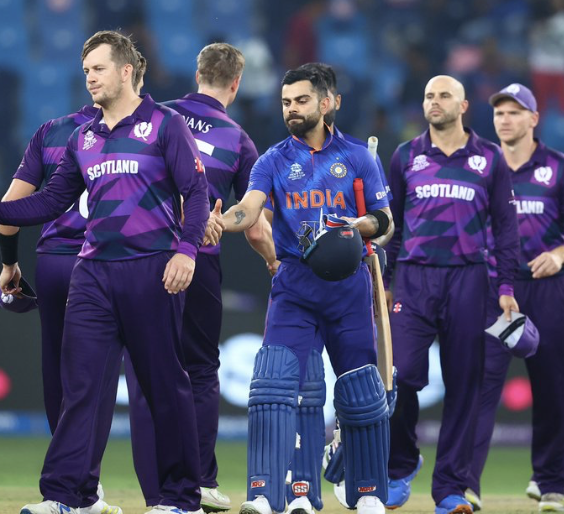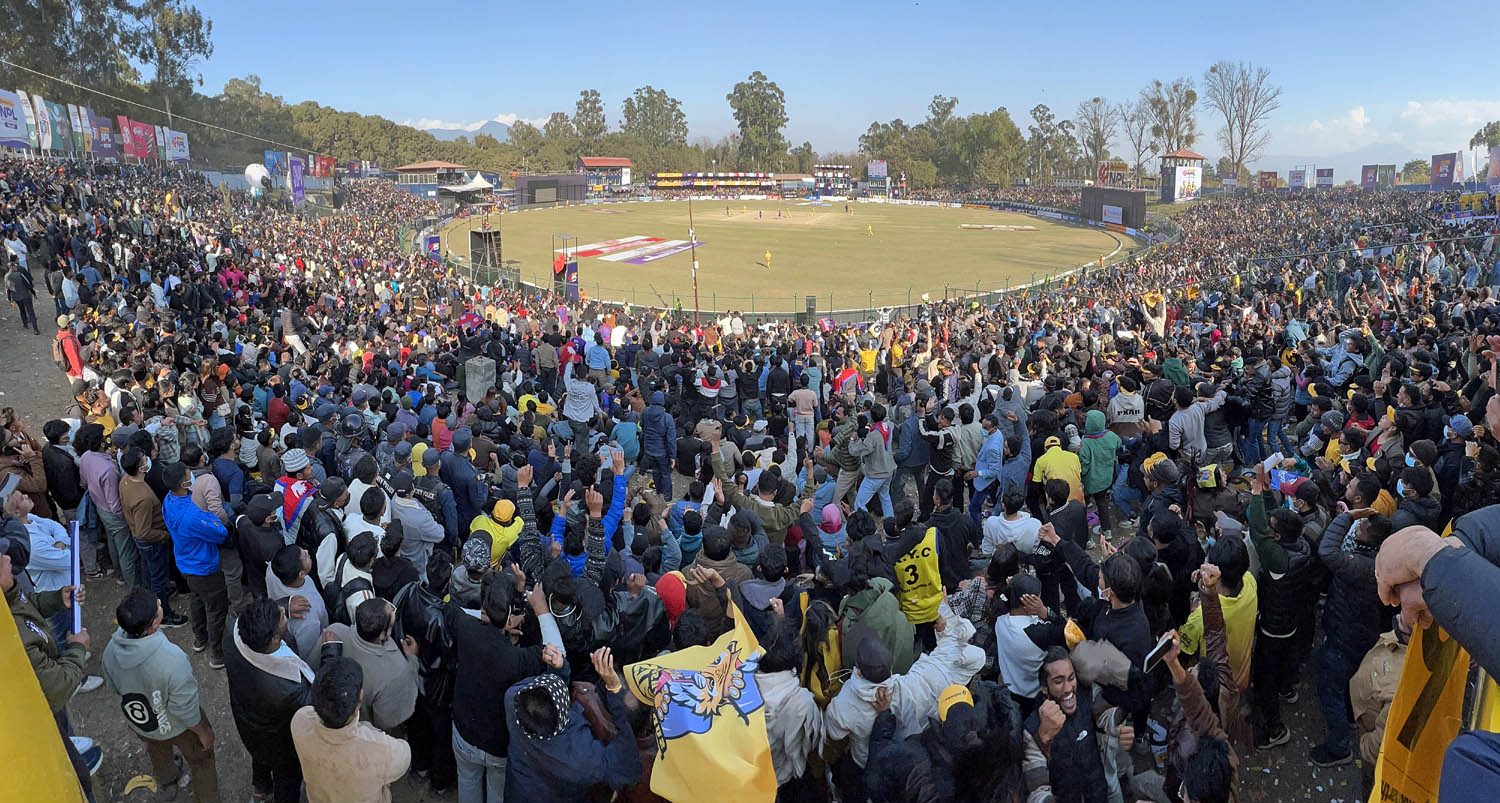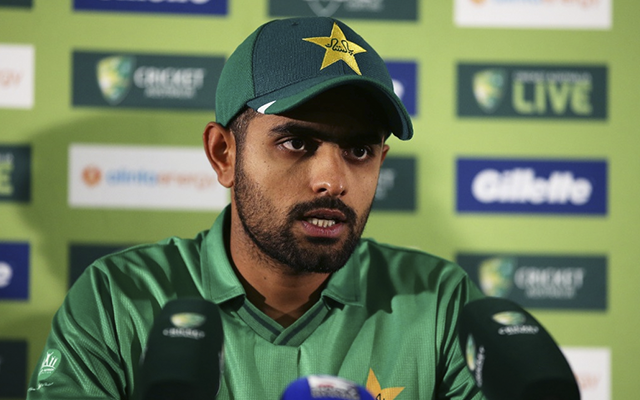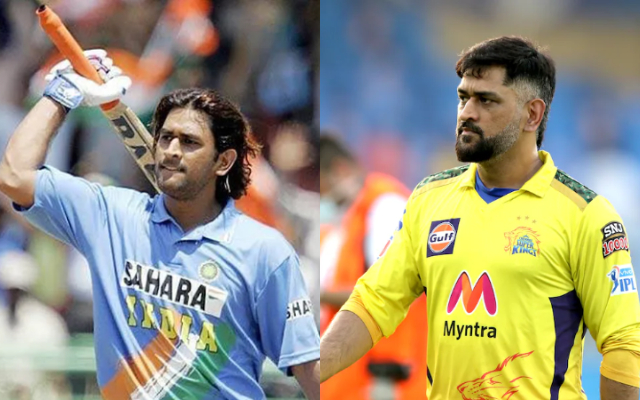CRICKET
ICC T20: India thrash Scotland

India outclassed Scotland in every department and in the process, hugely boosted their NRR.
Now they just need to win their last game against Namibia and hope that Afghanistan beat New Zealand but with a lesser margin.
Virat Kohli the birthday boy finally won the toss and he elected to bowl first.
The Indian bowlers started well. Bumrah bowled out the Scottish skipper with a splendid slower ball.
G. Munsey was looking very good; he smashed a brilliant six off Bumrah in the very first over.
He then hit 3 consecutive fours in Ashwin’s over but he was dismissed on 24(19).
While trying to play a shot towards long-on, he was caught on mid-on by Hardik Pandya off M. Shami in the 6th over.
Scotland ended their power play on a score of 27-2, having played two maiden overs in the power play.
Jadeja shines with the ball
After the brilliant start by Bumrah and Shami, Jadeja joined the party and destroyed the Scottish middle order with sublime off-spin bowling.
He dismissed both the main batters of Scotland, Berrington and M. Cross in the same over.
He then dismissed the dangerous-looking Leask in the 12th over of the innings.
Jadeja ended his spell with 3 wickets for 15 runs in his 4 overs.
Out-classed by Indian bowlers
Scotland scored just 44 runs with the loss of 4 wickets and lost half their side for just 58 runs.
Shami destroyed the lower order with his unplayable yorkers and also picked up 3 wickets for 15 runs from his 3 overs.
The whole Scotland team was dismissed on just 85 runs in 17.4 overs and Munsey was the top scorer with 24 runs.
All the Indian bowlers were superb especially Jadeja and Shami who both picked up 3 wickets.
Ashwin picked up 1 wicket for 29 runs in 4 overs.
Bumrah bagged 2 wickets for just 10 runs in 3.4 overs.
India got a huge NRR boost
India was required to chase down the target of 85 in 7.1 overs to surpass Afghanistan’s NRR.
India managed to do that in just 6.3 overs.
Both the Indian openers started superbly and they smashed the Scottish bowling with some great hitting.
Rohit Sharma (30 runs off 16 balls) was dismissed on the last ball of the fifth over.
KL Rahul played a sensational knock and scored the fourth fastest fifty in T20 world cup history.
He completed his half-century in just 18 balls including 6 fours and 3 sixes.
Rahul once again proved that he is one of the finest white balls players in the world right now.
Fastest 50s in T20 World Cups (By balls)
12 balls Yuvraj Singh v England Durban 2007
17 balls Stephan Myburgh v Ireland Sylhet 2014
18 balls Glenn Maxwell v Pakistan Mirpur 2014
18 balls KL Rahul v Scotland Dubai 2021
Highest Power play scores by India
India scored 82 runs in the power play which is their highest ever.
82/2 v Scotland Dubai 2021
78/2 v South Africa Johannesburg 2018
77/1 v Sri Lanka Nagpur 2009
76/1 v New Zealand Johannesburg 2007
SCORECARD
| Scotland 17.4 overs 85 all out | India 6.3 overs 89-2 |
| Munsey 24 (19) | KL Rahul 50 (19) |
| Leask 21 (12) | R. Sharma 30 (16) |
| McLeod 16 (28) | S.Yadav 6* (2) |
| Jadeja 3-15 | M. Watt 1-20 |
| Shami 3-15 | B. Wheal 1-32 |
| Bumrah 2-10 |
BIG NEWS
Nepal Premier League Becomes a Watershed Moment for Nepali Cricket

The NPL has become a watershed moment for Nepali cricket, elevating the sport to new heights. With its success, the league has brought national and international attention to Nepali cricket, attracting a broader fan base and better sponsorships.
This landmark event showcases the immense talent present in Nepal and provides a platform for local players to shine. The league has paved the way for a new generation of cricketers to gain recognition and advance their careers in the sport.
The NPL has also given Nepali cricket more global exposure. International players joining the league help raise the level of competition, further inspiring the local players. The league’s popularity continues to grow as it evolves and promises to be a cornerstone of Nepali cricket in the years to come.
As the league progresses, it is expected to inspire future stars and increase the overall development of cricket in Nepal. Fans eagerly follow every match, enjoying the thrilling action and supporting their favorite players and teams.
In conclusion, the Nepal Premier League has transformed Nepali cricket, setting the stage for future growth. This momentous development will surely lead to even greater success for Nepali cricket on the international stage.
The NPL has also sparked interest in domestic leagues across emerging cricket nations. It serves as a model for other countries to develop their cricketing infrastructure and provide young talent. As the NPL continues to grow, it is expected to play a vital role in shaping the future of Nepali cricket.
Fans have embraced the tournament, creating a sense of national pride. The NPL’s rise reflects the growing global interest in domestic cricket leagues and their role in nurturing future talent. It’s a significant milestone for Nepali cricket, ensuring that the sport will continue to evolve in the coming years.
BGT
Simon Katich Criticizes George Bailey’s Call to Axe Nathan McSweeney from Australian Team

Simon Katich has sharply criticized George Bailey’s decision to drop Nathan McSweeney from the Australian team. Simon Katich believes this call was a poor decision, especially after McSweeney’s consistent performance. Bailey’s choice has sparked discussions about the selection process and the reasoning behind it.
McSweeney’s exclusion has raised eyebrows, with many questioning why a player with such promise was dropped. Katich, in particular, feels that Bailey’s decision to axe McSweeney is questionable, especially when compared to the struggles of other top-order batters. Both teams in the recent series have faced challenges with their top-order batting, but the Australian selectors decided to make this change.
Katich’s comments reflect growing concerns about the selection strategy and the impact of dropping McSweeney. He pointed out that many players have struggled with their form, yet McSweeney was chosen to be left out. This, Katich argues, highlights the inconsistency in the decision-making process.
Top-order batters in both teams have faced difficulties, with neither side managing to produce consistent runs. Despite these struggles, the decision to remove McSweeney has left fans and experts questioning the rationale behind the move. Some believe that dropping McSweeney might have been premature, given the form of other players.
Katich’s criticism brings attention to the broader issue of player selections in international cricket. As teams prepare for future series, these decisions are likely to influence the direction of Australian cricket. The focus now shifts to how Bailey and the selectors will handle similar challenges in upcoming matches.
The debate continues, with many calling for more transparent and consistent decision-making regarding player selections in international cricket.
BGT
Steve Smith and Travis Head Address BCCI’s Influence in Cricket

Steve Smith recently commented on BCCI’s influence in cricket, sparking debates about its significant role in global governance. During a media interaction, Smith remarked that the International Cricket Council (ICC) appears less powerful than the Board of Control for Cricket in India (BCCI). This statement drew attention, prompting Smith to clarify his intentions quickly.
Smith acknowledged that the BCCI holds a dominant position in cricket due to its financial and organizational contributions. He pointed out how the Indian board influences key decisions that shape the sport. However, Smith softened his tone, emphasizing that his comments were not meant as criticism of either the ICC or the BCCI.
Travis Head, Smith’s Australian teammate, also addressed BCCI’s influence in cricket. Head humorously referred to the Indian board as “rulers,” recognizing its ability to set global standards in cricket. He highlighted the board’s pivotal role in defining policies and establishing benchmarks for the sport.
These remarks have reignited discussions about power dynamics in international cricket. Critics argue that the BCCI’s financial clout often overshadows smaller cricketing nations. They believe this imbalance can hinder fair representation in decision-making. On the other hand, supporters emphasize the BCCI’s critical role in expanding cricket’s global reach and popularity.
As India hosts the ICC Cricket World Cup, the spotlight remains on the BCCI’s influence in cricket. The board’s central role in shaping schedules, policies, and trends continues to drive conversations about equity in the sport. Smith and Head’s remarks reflect ongoing concerns about maintaining fairness and inclusivity in global cricket governance.
Their comments underscore the need for balanced representation to ensure a fair future for cricket.
-

 FILMY1 year ago
FILMY1 year agoWATCH: Tripti Dimri shocks audiences with daring nude sequence in Ranbir Kapoor starrer ‘Animal’
-

 BIG NEWS2 years ago
BIG NEWS2 years agoRiva Arora, aged 12, romances with Karan Kundrra in viral video
-

 BIG NEWS2 years ago
BIG NEWS2 years agoMeet the sexiest female golfer ever!
-

 LATEST2 years ago
LATEST2 years agoThe sexiest tennis star on the planet. Do you agree?
-

 CRICKET1 year ago
CRICKET1 year ago‘Bloody dump captain’ – Former Pakistan cricketer lashes out at Babar Azam and staff for mismanagement of fast bowlers in Asia Cup 2023
-

 FILMY1 year ago
FILMY1 year agoWATCH: After Tripti Dimri, Rashmika Mandanna’s intimate scene with Ranbir Kapoor in ‘Animal’ goes viral on internet
-

 CRICKET1 year ago
CRICKET1 year agoTop 10 hairstyle of MS Dhoni from 2007 to 2023
-

 FILMY1 year ago
FILMY1 year agoDid you know Simi Garewal dated India’s iconic industrialist Ratan Tata? Know more about this










